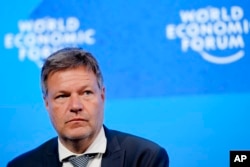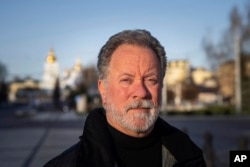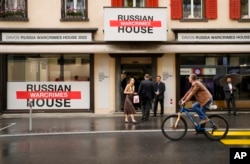Ukrainian President Volodymyr Zelenskyy told world leaders and business executives at the World Economic Forum in Davos, Switzerland Monday that they faced a turning point following Russia’s invasion of his country — and that it was time to ratchet up sanctions against Moscow.
It is the first time world and business leaders have gathered at Davos since January 2020, just before the coronavirus pandemic. They now operate in a vastly changed world faced with numerous challenges: the war in Ukraine, economic crises and food shortages.
Maximum sanctions
Dressed not in the business uniform of the Davos elite but in the army fatigues of a wartime leader, Ukraine’s president addressed delegates by video link from Kyiv. He demanded “maximum sanctions” on Russia.
“An embargo on Russian oil, a complete blockade of all Russian banks, without exception. Total abandonment of the Russian IT sector and complete cessation of trade with the aggressor… do not wait for Russia’s use of special weapons, chemical, biological, God forbid, nuclear,” Zelenskyy urged the audience in Davos.
“You need to set a precedent for the complete exit of all foreign businesses from the Russian market so that your brands are not associated with war crimes and that war criminals do not use your offices, accounts, and goods in their bloody interests.”
Ukraine has sent a large delegation to Davos, including the mayor of Kyiv, Vitali Klitschko. “Every one of you has to understand: we are defending you, personally,” Kiltschko said Monday. “We are fighting for values. I hope the same values, democratic values.”
The message from the Ukrainian delegation has been warmly welcomed. But Kyiv’s demands for a complete embargo on Russian energy and trade are far from being met.
Embargo
Several European nations, including Germany, continue to import Russian oil and gas. Hungary is resisting efforts toward a full EU embargo on Russian oil imports.
Germany’s economy minister and vice chancellor, Robert Habeck, urged Hungary to join its EU partners.
“We have to be very careful that we are not applying the same rules for everyone and not seeing the difficult situation some states are in. But saying that, I expect everyone — also Hungary — that they work to find a solution and not saying, ‘OK, we have an exception and then we will lay back and build on our partnership with Putin,’” Habeck said.
Sven Smit, a senior partner with consulting firm McKinsey & Company in the Netherlands and among the delegates at Davos, said isolating Russia would take time. “This is a fight we can’t fully participate in, but we are trying to do our best, I think. You feel a little helpless, if you stand there and see what the Ukrainians have to do for us, to stand for our values and to stand for our lives,” Smit told Reuters.
Food warning
Meanwhile the head of the United Nations’ World Food Program, David Beasley, warned of a global food crisis unless Russia ended its blockade of Ukraine’s Black Sea ports.
“[Ukraine] grows enough food to feed 400 million people. That’s off the market and the only way you get it back into the market is the ports have to be opened back,” Beasley said Monday.
“It’s going to be a global food crisis. If we don’t get those ports open, you will be talking about a food pricing problem over the next 10 to 12 months, but next year, it’s going to be a food availability problem and that is going to be hell on Earth,” he added.
War crimes
Russian delegates haven’t been invited to the WEF. Instead, the former “Russia House” in Davos has been transformed into what’s been dubbed the “Russian War Crimes House,” depicting alleged atrocities carried out by the Kremlin’s forces.
The exhibition’s curator, Bjorn Geldhof, the artistic director of the PinchukArtCentre in Kyiv, said it was vital that visitors to the Davos summit are reminded of the reality of the war.
“The atrocities that are happening are of such a massive scale that it’s important to speak to everybody about it all the time. And here in Davos, the world’s most powerful people come together, and to them we also have to show who is suffering and why they are suffering,” Geldhof said.



